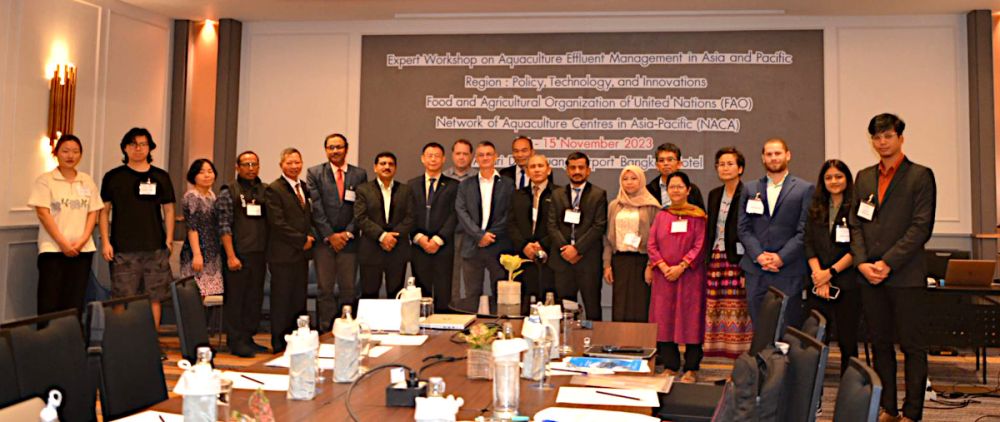Expert Workshop on Aquaculture Effluent Management held in Bangkok
1 November 2023 | 3081 views | Bangladesh, Better management practices, Cambodia, China, Environment and Sustainability, India, Indonesia, Lao PDR, Malaysia, Nepal, Philippines, Sri Lanka, Thailand, Vietnam, Water quality

In 2023, FAO and NACA initiated a consultation process on aquaculture effluent management in Asia and the Pacific in collaboration with NACA member governments. Experts across the region gathered information to assess the state of governance, advancements in technology and innovation in aquaculture effluent management.
The Asia-Pacific region has been leading the world in aquaculture production for decades, producing 91.6 % of globally farmed aquatic animals and algae in 2020. Aquaculture is contributing to multiple Sustainable Development Goals including ending hunger, improving health and nutrition, responding to climate change, wealth creation and poverty reduction, gender equality, and decent work. The region will likely continue to play the leading role in global aquaculture development in the future to provide sufficient and nutritious aquatic foods for the growing population.
Notwithstanding the past achievements, the future requires that aquaculture in the region grows continuously under a broad range of challenges ranging from competition and conflict use of resources to environmental pressure, and climate change. Sustainable intensification is the primary approach to transform aquaculture in the region towards more efficient, inclusive, resilient, and sustainable aquatic food systems. The environmental resilience of aquaculture systems, much determined by the effluent reduction, reuse, and recycling, is one of the fundamental pillars supporting sustainability in the intensification.
Aquaculture effluent management represents the major technical and engineering challenge to ensure resource efficiency and environmental integrity of farming systems. Innovations and technology for aquaculture waste management have been fast advancing in recent years in the region. These include the development of new farming systems, reconfiguration, and improvement of the integration of farming components, improved feed, and feeding technology to increase feed utilisation efficiency, and novel engineering, mechanical and biological designs for effluent treatment. In addition, policies and regulations developed at the national level for aquaculture effluent management have gradually evolved into more efficient and effective institutional mechanisms for better governance of the sector.
However, there are disparities in technological development and governance among nations in the region regarding aquaculture effluent management. There is a need to facilitate collaboration, information exchange, and experience sharing to accelerate technology extension and scaleup of innovations for aquaculture effluent management.
The consultative process culminated in an expert workshop, convened from 14 to 15 November, funded by FAO, to share views and national experiences on aquaculture effluent management. The workshop was attended by 31 people from 12 countries including Bangladesh, Cambodia, China, India, Indonesia, Lao PDR, Malaysia, Nepal, Philippines, Sri Lanka, Thailand, and Vietnam, with representatives from the Thailand Department of Fisheries and Asian Institute of Technology.
The workshop forms part of a broader process to promote good practices and build technical and governance capacity for aquaculture effluent management. It will contribute to the larger goal of transforming aquaculture in the region towards more efficient, inclusive, resilient, and sustainable aquatic food systems. The specific objectives of the workshop were to:
- Review and examine existing national policies, regulations, and institutional setups for aquaculture effluent management and governance.
- Showcase technological advances and innovations in aquaculture effluent management and governance.
- Identify country-specific challenges and issues in governance on aquaculture effluent management and governance.
- Identify national and regional needs for technical assistance and capacity building on aquaculture effluent management and governance.
- Recommend future policy directions, priority areas for governance, technology development, innovation, and capacity building in aquaculture effluent management in the region.
Creative Commons Attribution.